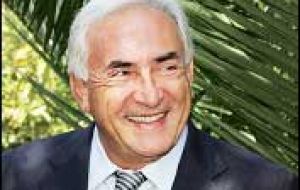MercoPress. South Atlantic News Agency
European Strauss-Kahn selected to lead IMF by ample “consensus”
 New IMF Director Dominique Strauss-Kahn
New IMF Director Dominique Strauss-Kahn Former French finance minister Dominique Strauss-Kahn was selected September 28 as the new Managing Director of the IMF. The IMF Executive Board said it selected Strauss-Kahn, 58, by consensus to succeed Rodrigo de Rato for a five-year term beginning November 1.
The IMF Board considered two candidates for the post after de Rato's June 28 announcement that he intended to leave the institution in October. Strauss-Kahn, a French national, was nominated by IMF Executive Director for Germany Klaus Stein on behalf of the European Union. Josef Tosovsky, a Czech national and former Czech prime minister and central bank governor, was nominated by Executive Director for Russia Aleksei Mozhin. The Managing Director is the chief of the IMF operating staff and Chairman of the Executive Board. He is assisted by three Deputy Managing Directors. In a statement following the IMF announcement, Strauss-Kahn said "the strong legitimacy derived from the very broad support I received, notably from emerging market and low-income countries, I am determined to pursue without delay the reforms needed for the IMF to make financial stability serve the international community, while fostering growth and employment". His statement was interpreted as an olive branch to developing countries given the insistence of the European Union on retaining its rights under a historic gentlemen's agreement with the United States to choose one of its own citizens to head the 185-nation IMF. This openly angered some countries outside the circle of rich economies and led Russia to sponsor the Czech canidate. Outgoing de Rato welcomed Strauss-Kahn's selection, noting in a statement that he had known and worked with Strauss-Kahn for many years. "I know he possesses the experience, vision, and dedication to public service needed to successfully lead the IMF at this important juncture," de Rato said. He also expressed appreciation to the Executive Board for having conducted the selection "through a transparent and competitive process." Strauss-Kahn has been a member of the French National Assembly and is Professor of Economics at the Institut d'Etudes Politiques de Paris. He served as Minister of the Economy, Finance and Industry from June 1997 to November 1999. He also served as Minister of Industry and International Trade from 1991-1993. Between 1993 and 1997, Mr. Strauss-Kahn joined the private sector as a corporate lawyer. Since 2000, Strauss-Kahn has taught economics at the Institut d'Etudes Politiques de Paris and he has been a visiting professor at Stanford University. He holds a PhD in economics from the University of Paris. He is married and has four children. World Bank Group President Robert B. Zoellick congratulated Strauss-Kahn on his appointment, saying he looked forward to enhancing cooperation between the IMF and World Bank. "This partnership is crucial to ensure that developing countries receive the best possible support, advice, and financial services," Zoellick said. "Our cooperation is important to ensuring globalization becomes more inclusive and sustainable so more people will share in the benefits of improved economic growth." Tosovsky and Strauss-Kahn were interviewed by the IMF Board in Washington in September. In his September 20 statement to the Board, Strauss-Kahn said the IMF was at a crossroads. Its very existence as the major institution providing financial stability to the world might be at stake, and rebuilding its relevance and legitimacy would be a hard task. Strauss-Kahn told the IMF Board that financial stability and macroeconomic stability are closely interlinked, as they also are a key determinant of the broad concept of security. "All of this means that the IMF should retain a central role in a context that is completely different from the one which prevailed when it was created," he stated. Following his July adoption as the EU candidate to head the IMF, Strauss-Kahn embarked on a world tour to, as he said in his statement to the IMF Board, visit as many IMF members as possible. "I tried to focus on emerging, developing, and less developed countries in order to collect information, complaints, and wishes about the future of the IMF," he told the Board. Strauss-Kahn visited countries in Africa, Asia, Latin America, and the Middle East. In a Wall Street Journalop-ed on September 6, Strauss Kahn said: "As the candidate of reform, I would aim to steer the IMF on a path to confront and surmount its major challenges: adapting the institution to a changing world while reflecting the views and needs of all members." He added he was confident that, if appointed, he would "find the necessary support to implement an ambitious reform program to ensure the enduring relevance of the IMF in a rapidly changing world economy."




Top Comments
Disclaimer & comment rulesCommenting for this story is now closed.
If you have a Facebook account, become a fan and comment on our Facebook Page!